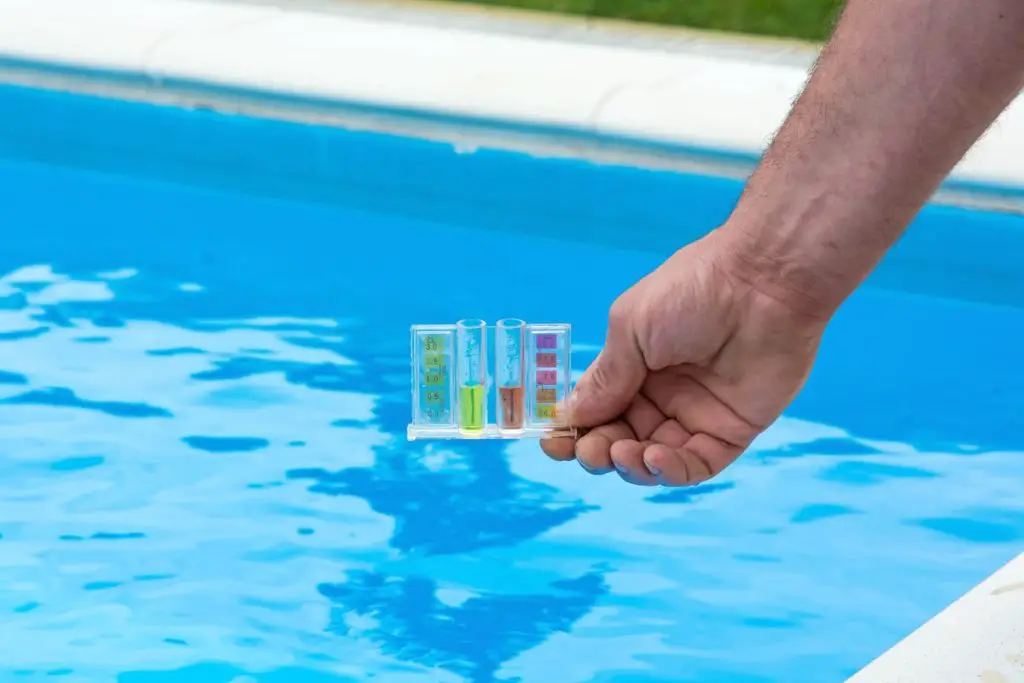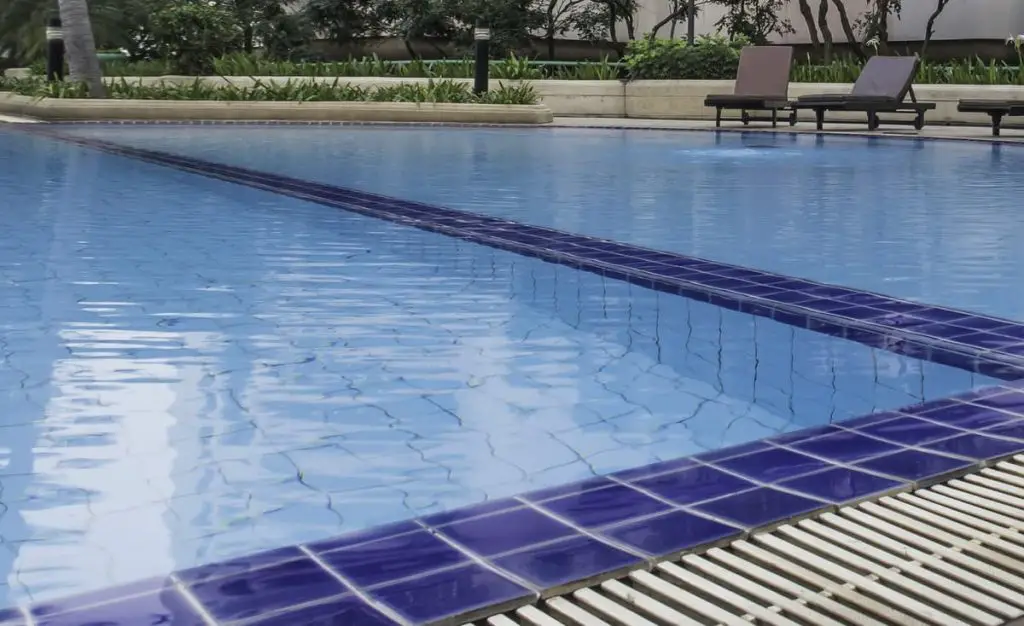Keeping your pool clean is one of the most important things you must do to maintain. While there are multiple ways to ensure your pool water is safe to swim in, using chlorine is one of the most efficient methods to ensure you don’t have to refill your pool constantly. However, you might wonder if the amount of chlorine in your water might make it evaporate faster.
Chlorine doesn’t make your pool water evaporate faster. Whether or not you have chlorine in your water, it will evaporate at the same rate. However, it might seem like chlorine is causing your water to evaporate faster because chlorine takes longer to evaporate, causing a higher concentration.
Keep reading to learn in more detail why chlorine doesn’t make your pool water evaporate faster, what causes evaporation, and how you can stop it from happening to your pool.

The Purpose Of Chlorine In a Pool
Chlorine is considered a harsh chemical and does a lot to the water. Its main purpose is to kill bacteria, so you can keep your pool filled for longer without changing the water.
Without chlorine, public pools would have to close much more often because the high turnover of swimmers would cause too much bacteria in the pool for safe swimming.
The reason why a pool might close after an untimely child’s accident is that, sometimes, there are too many bacteria in the pool for the chlorine to be able to kill right away. This is why it might need more time or more chlorine to be able to do that.
However, while chlorine is a powerful additive for pool water, it doesn’t mean its effects are all-encompassing.
To see why maintaining pool water chemistry is critical, check out my guide on Water Chemistry Basics.
Evaporation Rate Of Chlorine
Chlorine is a volatile liquid chemical, so it won’t stay in its liquid form indefinitely. However, it evaporates slower than water, meaning the chlorine concentration in your pool will increase slightly as the water naturally evaporates.
That might make it seem like the chlorine is causing your water to evaporate quicker, but that’s not the case. Chlorine does not affect the rate of a pool’s evaporation.
The only thing chlorine affects the number of bacteria present in the water.
On the bright side, if you add too much chlorine to your pool water, as can sometimes happen, you don’t have to worry about draining your pool to get rid of it. As long as the amount of chlorine is still considered safe, you can naturally allow it to evaporate over time.
Causes Of Evaporation In Pool Water
Evaporation is a natural part of the water cycle.
While we all learned that water goes through a process that starts with water collecting in an area and ends with precipitation, you might not realize that this also affects artificial bodies of water. That means that your swimming pool is subject to evaporation which will cause its water level to go down over time.
The main causes of pool water evaporation are the same as the causes of evaporation for any other body of water, which include:
- Sunlight
- Humidity
- Wind
- Temperature
Let’s look at these causes in a little more detail.

Sunlight Turns Water Into Steam
Sunlight is the primary cause of water evaporation because it turns water into steam. The heat causes the water to get hot; if it gets hot enough, it evaporates as steam. If you have an outdoor pool, it likely has some sun exposure during the day, which means it has more time to evaporate.
Wind Lifts Water Out Of the Pool
Wind may not seem like a prime cause of evaporation, but it plays an important role in this process. Wind will lift water out of your pool which will prime it for evaporation either directly or by causing water to collect in small puddles around your pool which will evaporate faster.
If your pool is regularly exposed to wind or light breezes, it could accelerate its water evaporation rate.
Humidity
The level of humidity in the air is another large cause of evaporation. If you live in a dry climate, for example, your pool will evaporate faster than somewhere more humid because the air isn’t already saturated with water particles.
That means that someone who lives in Arizona will likely have a bigger pool evaporation problem than someone who lives in Florida.
Temperature
Temperature is the final leading cause of pool water evaporation. There’s a reason why there tends to be less water evaporation in colder months. Water molecules will be more likely to slow down or even stop as water freezes when temperatures get colder.
Temperature is also an evaporation cause because of the difference between the temperature of the air and your water. This temperature difference can create the perfect situation for evaporation to occur.
How To Stop Pool Water Evaporation
Though water evaporation is a natural part of the water cycle, there are things you can do to keep it from ruining your ability to enjoy your swimming pool.
The biggest thing you can do to prevent your pool water from evaporating is to invest in a pool cover. This will be a large, specially designed piece of material that you pull over your pool when it’s not being used.
It might add a few minutes of preparation time both before and after you swim because you’ll need to uncover and recover your pool, but it will save you from refilling your pool as often.
You can also invest in planting trees or installing an awning to partially cover your pool. While this won’t entirely block sun and wind from hitting your pool, it decreases the amount of exposure your pool has to these elements. That will cut down on them, accelerating the rate your water evaporates at.
Finally, you can lower your pool water’s temperature. Your pool water will almost always be warmer than the air temperature, no matter how warm it is.
That’s because humans can’t swim in water that is below 60℉ (16℃). However, they should actually swim in water that’s much warmer than that.
If you lower your pool’s temperature a few degrees, especially on hot days in the summer when you’ll be able to tolerate cooler water better, then you can decrease the difference in temperature between the pool and the air.
This will slightly decrease your pool’s evaporation rate.
In Conclusion
As much as it might seem like it, chlorine doesn’t make your pool water evaporate any faster. Chlorine just evaporates a little slower than water does naturally. Dealing with water evaporation is just a part of having a pool. Luckily, you can take steps to decrease the amount of water you lose to this natural process.
